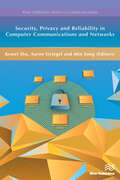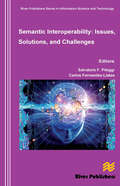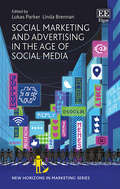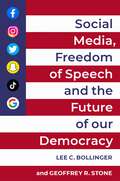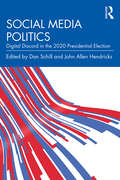- Table View
- List View
The Routledge Handbook of Public Speaking Research and Theory (Routledge Handbooks in Communication Studies)
Providing a comprehensive survey of the empirical research, theory, and history of public speaking, this handbook fills a crucial gap in public speaking pedagogy resources and provides a foundation for future research and pedagogical development.Bringing together contributions from both up-and-coming and senior scholars in the field, this book offers a thorough examination of public speaking, guided by research across six key themes: the history of public speaking; the foundations of public speaking; issues of diversity, equity, and inclusion; considerations of public speaking across contexts; assessment of public speaking; and the future of public speaking in the twenty-first century. The evidence-based chapters engage with a broad discussion of public speaking through a variety of viewpoints to demonstrate how subtopics are connected and fraught with complexity. Contributors explore public speaking in education, business and professional settings, and political contexts, and outline how skills learned through public speaking are applicable to interpersonal, small group, and business interactions.Reinforcing the relevance, importance, and significance of public speaking in individual, interpersonal, social, and cultural communication contexts, this accessibly written handbook will be an indispensable resource for public speaking instructors and program administrators. It will also be valuable reading for Communication Pedagogy and Introduction to Graduate Studies courses.
The Routledge Handbook of Translation and Politics (Routledge Handbooks in Translation and Interpreting Studies)
The Routledge Handbook of Translation and Politics presents the first comprehensive, state of the art overview of the multiple ways in which ‘politics’ and ‘translation’ interact. Divided into four sections with thirty-three chapters written by a roster of international scholars, this handbook covers the translation of political ideas, the effects of political structures on translation and interpreting, the politics of translation and an array of case studies that range from the Classical Mediterranean to contemporary China. Considering established topics such as censorship, gender, translation under fascism, translators and interpreters at war, as well as emerging topics such as translation and development, the politics of localization, translation and interpreting in democratic movements, and the politics of translating popular music, the handbook offers a global and interdisciplinary introduction to the intersections between translation and interpreting studies and politics. With a substantial introduction and extensive bibliographies, this handbook is an indispensable resource for students and researchers of translation theory, politics and related areas.
The Sage Handbook of Qualitative Research in Organizational Communication
The Sage Handbook of Qualitative Research in Organizational Communication is a state-of-the-art resource for scholars, students, and practitioners seeking to deepen their understanding and expertise in this dynamic field. Written by a global team of established and emerging experts, this Handbook provides a comprehensive exploration of the field’s foundational traditions of epistemology and theory, as well as its latest methodologies, methods, issues, and debates. The volume reflects a diverse range of approaches (e.g., mixed-methods, ethnographic, rhetorical, pragmatist, phenomenological, feminist, critical race, postcolonial, queer, and engaged), and covers a broad spectrum of topics ranging from data collection and analysis, to representation. Additionally, this Handbook addresses emerging trends such as digital forensics, post-qualitative research, and the transformative impact of COVID-19 on the conduct of qualitative research in organizational communication. As the first volume of its kind in this field, The Sage Handbook of Qualitative Research in Organizational Communication is a cornerstone text for scholars, students, and practitioners interested in understanding the vital role of communication in organizational life. Part 1: Approaches to Qualitative Organizational Communication Research Part 2: Data Collection in Qualitative Organizational Communication Research: Methods and Issues Part 3: Data Analysis and Representation in Qualitative Organizational Communication Research: Methods and Issues Part 4: The Future of Qualitative Organizational Communication Research
The SAGE Handbook of the Digital Media Economy
Debates about the digital media economy are at the heart of media and communication studies. An increasingly digitalised and datafied media environment has implications for every aspect of the field, from ownership and production, to distribution and consumption. The SAGE Handbook of the Digital Media Economy offers students, researchers and policy-makers a multidisciplinary overview of contemporary scholarship relating to the intersection of the digital economy and the media, cultural, and creative industries. It provides an overview of the major areas of debate, and conceptual and methodological frameworks, through chapters written by leading scholars from a range of disciplinary perspective. PART 1: Key Concepts PART 2: Methodological Approaches PART 3: Media Industries of the Digital Economy PART 4: Geographies of the Digital Economy PART 5: Law, Governance and Policy
Science Periodicals in Nineteenth-Century Britain: Constructing Scientific Communities
Periodicals played a vital role in the developments in science and medicine that transformed nineteenth-century Britain. Proliferating from a mere handful to many hundreds of titles, they catered to audiences ranging from gentlemanly members of metropolitan societies to working-class participants in local natural history clubs. In addition to disseminating authorized scientific discovery, they fostered a sense of collective identity among their geographically dispersed and often socially disparate readers by facilitating the reciprocal interchange of ideas and information. As such, they offer privileged access into the workings of scientific communities in the period. The essays in this volume set the historical exploration of the scientific and medical periodicals of the era on a new footing, examining their precise function and role in the making of nineteenth-century science and enhancing our vision of the shifting communities and practices of science in the period. This radical rethinking of the scientific journal offers a new approach to the reconfiguration of the sciences in nineteenth-century Britain and sheds instructive light on contemporary debates about the purpose, practices, and price of scientific journals.
Science-Slam: Multidisziplinäre Perspektiven auf eine populäre Form der Wissenschaftskommunikation
Der Science-Slam ist eine weitverbreitete Form der populären Wissenschaftskommunikation in Deutschland. Science-Slam-Veranstaltungen erfreuen sich großer Beliebtheit beim Publikum, stehen aber mitunter auch in der Kritik, da die Verbindung von Unterhaltung und Wissenschaftskommunikation als problematisch eingeschätzt wird. Der Band vereint Beiträge, die aus unterschiedlichen disziplinären Perspektiven Science-Slams in den Blick nehmen. Auf diese Weise werden Science-Slams sowohl in ihrer Mikrostruktur analysiert als auch hinsichtlich ihrer Relevanz für die gesellschaftsbezogenen Ziele von Wissenschaftskommunikation beleuchtet.
Security for Multihop Wireless Networks
Security for Multihop Wireless Networks provides broad coverage of the security issues facing multihop wireless networks. Presenting the work of a different group of expert contributors in each chapter, it explores security in mobile ad hoc networks, wireless sensor networks, wireless mesh networks, and personal area networks.Detailing technologies
Security, Privacy and Reliability in Computer Communications and Networks
Future communication networks aim to build an intelligent and efficient living environment by connecting a variety of heterogeneous networks to fulfill complicated tasks. These communication networks bring significant challenges in building secure and reliable communication networks to address the numerous threat and privacy concerns. New research technologies are essential to preserve privacy, prevent attacks, and achieve the requisite reliability. Security, Privacy and Reliability in Computer Communications and Networks studies and presents recent advances reflecting the state-of-the-art research achievements in novel cryptographic algorithm design, intrusion detection, privacy preserving techniques and reliable routing protocols. Technical topics discussed in the book include: Vulnerabilities and Intrusion DetectionCryptographic Algorithms and EvaluationPrivacyReliable Routing ProtocolsThis book is ideal for personnel in computer communication and networking industries as well as academic staff and collegial, master, Ph.D. students in computer science, computer engineering, cyber security, information insurance and telecommunication systems.
Semantic Interoperability Issues, Solutions, Challenges
Semantic technologies are experimenting an increasing popularity in the context of different domains and applications. The understanding of any class of system can be significantly changed under the assumption any system is part of a global ecosystem known as Semantic Web.The Semantic Web would be an evolving extension of current Web model (normally referred as Syntactic Web) that introduces a semantic layer in which semantics, or meaning of information, are formally defined.So, semantics should integrate web-centric standard information infrastructures improving several aspects of interaction among heterogeneous systems. This is because common interoperability models are progressively becoming obsolete if compared with the intrinsic complexity and always more distributed focus that feature modern systems. For example, the basic interoperability model, that assumes the interchange of messages among systems without any interpretation, is simple but effective only in the context of close environments. Also more advanced models, such as the functional interoperability model that integrates basic interoperability model with the ability of intepretating data context under the assumption of a shared schema for data fields accessing, appears not able to provide a full sustainable technologic support for open systems.The Semantic Interoperability model would improve common interoperability models introducing the interpretation of means of data. Semantic interoperability is a concretely applicable interaction model under the assumption of adopting rich data models (commonly called Ontology) composed of concepts within a domain and the relationships among those concepts.In practice, semantic technologies are partially inverting the common view at actor intelligence: intelligence is not implemented (only) by actors but it is implicitly resident in the knowledge model. In other words, schemas contain information and the "code" to interpretate it.
Shakespeare, Italy, and Transnational Exchange: Early Modern to Present (Routledge Studies in Shakespeare)
This interdisciplinary, transhistorical collection brings together international scholars from English literature, Italian studies, performance history, and comparative literature to offer new perspectives on the vibrant engagements between Shakespeare and Italian theatre, literary culture, and politics, from the sixteenth to the twenty-first century. Chapters address the intricate, two-way exchange between Shakespeare and Italy: how the artistic and intellectual culture of Renaissance Italy shaped Shakespeare’s drama in his own time, and how the afterlife of Shakespeare’s work and reputation in Italy since the eighteenth century has permeated Italian drama, poetry, opera, novels, and film. Responding to exciting recent scholarship on Shakespeare and Italy, as well as transnational theatre, this volume moves beyond conventional source study and familiar questions about influence, location, and adaptation to propose instead a new, evolving paradigm of cultural interchange. Essays in this volume, ranging in methodology from archival research to repertory study, are unified by an interest in how Shakespeare’s works represent and enact exchanges across the linguistic, cultural, and political boundaries separating England and Italy. Arranged chronologically, chapters address historically-contingent cultural negotiations: from networks, intertextual dialogues, and exchanges of ideas and people in the early modern period to questions of authenticity and formations of Italian cultural and national identity in the eighteenth and nineteenth century. They also explore problems of originality and ownership in twentieth- and twenty-first-century translations of Shakespeare’s works, and new settings and new media in highly personalized revisions that often make a paradoxical return to earlier origins. This book captures, defines, and explains these lively, shifting currents of cultural interchange.
Sine ira et studio: Disziplinenübergreifende Annäherungen an die zwischenmenschliche Kommunikation
Der Band gibt einen Überblick über aktuelle Debatten der Kommunikationswissenschaft und angrenzender Disziplinen. Fünf sowohl in der Tradition einer interpersonalen Kommunikationsforschung als auch in den gegenwärtigen Debatten wiederkehrende Themenkomplexe dienen dabei als Ausgangspunkte für empirisch interessierte und theoretisch reflektierte Annäherungen an Kommunikation als Koordination des Handelns. Fachvertreter benachbarter Disziplinen wie Soziologie, Germanistik, Anglistik, Philosophie, Journalistik und Geschichte beleuchten diese Themenkomplexe aus ihren je spezifischen Sichtweisen.
Social Justice, Activism and Diversity in U.S. Media History
This book offers a diverse approach to journalism history told from a multimedia perspective, re-examining mainstream stories and highlighting contributions that are often overlooked. Bringing together a team of prominent journalism historians, the volume centers race and ethnicity, gender and sexuality, class, religion, disability, mental health and generations to tell forgotten stories of journalism’s historical influence. The book is designed to appeal to Generation Z college students, offering budding mass communicators a valuable tool that addresses gaps in historical pedagogy and fosters representation in the classroom. Each chapter contains access to video and podcast extras, chapter summaries, guides to further reading and suggested activities to bring these narratives alive and keep readers engaged. Interactive and accessible, Social Justice, Activism and Diversity in U.S. Media History is an indispensable resource for Generation Z, scholars in mass communication and American history, journalists and general readers.
Social Marketing and Advertising in the Age of Social Media (New Horizons in Marketing series)
Reviewing and analysing the most relevant concepts, theories and strategies related to the field, this timely book reveals what makes for strong social marketing and social advertising campaigns. With a comprehensive understanding of social advertising models and their applications, chapters present original case studies and scenarios from international researchers to illustrate strategies and concepts in practice. Exploring the mechanics of social media, contributors highlight what makes a successful campaign. They evaluate the use and impact of emotions in social power, exploring the power of storytelling, whilst weighing ethical implications. The book covers important and upcoming areas of interest in the field including the rise of social media influencers, the use of memes, the functionality of social media, and the use of fear, guilt and shame in communications campaigns as well as positive emotions. This book will assist marketing academics and practitioners in the development of successful campaigns as it highlights not only what these campaigns look like, but also why they achieve success. It will also prove an excellent guide for government organisations and public policy makers interested in using social marketing for health promotion and social change.
Social Media, Freedom of Speech, and the Future of our Democracy
A broad explanation of the various dimensions of the problem of "bad" speech on the internet within the American context. One of the most fiercely debated issues of this era is what to do about "bad" speech-hate speech, disinformation and propaganda campaigns, and incitement of violence-on the internet, and in particular speech on social media platforms such as Facebook and Twitter. In Social Media, Freedom of Speech, and the Future of our Democracy, Lee C. Bollinger and Geoffrey R. Stone have gathered an eminent cast of contributors--including Hillary Clinton, Amy Klobuchar, Sheldon Whitehouse, Newt Minow, Cass Sunstein, Jack Balkin, Emily Bazelon, and others--to explore the various dimensions of this problem in the American context. They stress how difficult it is to develop remedies given that some of these forms of "bad" speech are ordinarily protected by the First Amendment. Bollinger and Stone argue that it is important to remember that the last time we encountered major new communications technology-television and radio-we established a federal agency to provide oversight and to issue regulations to protect and promote "the public interest." Featuring a variety of perspectives from some of America's leading experts on this hotly contested issue, this volume offers new insights for the future of free speech in the social media era.
Social Media, Fundamental Rights and Courts: A European Perspective (Routledge Research in Human Rights Law)
This volume examines European and national higher court decisions on social media from the perspective of fundamental rights and judicial dialogue. While the challenges social media poses for public policy and regulation have been widely discussed, the role of courts in this evolving legal area, especially from a fundamental rights standpoint, has hitherto remained largely underexplored. This volume probes the contribution of national and European judiciaries to the protection of fundamental rights in a social media setting and delves into patterns of dialogue and interaction between domestic courts, the Court of Justice of the EU (CJEU) and the European Court of Human Rights (ECtHR), and between the CJEU and the ECtHR. The book specifically examines the extent and ways in which national and European judges incorporate fundamental rights reasoning in their social media rulings. It also investigates the nature and breadth of the use of European supranational case law in domestic judicial assessment, and analyses the engagement of the CJEU and the ECtHR with the other’s case law. In doing so, the book instils jurisprudential dynamics into the study of social media law and regulation, exploring in particular the effects of European constitutionalism on the shaping and enforcement of fundamental rights in a social media context. Written by emerging and established experts in the field, this book will be essential reading for scholars of comparative, European and constitutional law, as well as those with a particular interest in digital technologies and social media.
Social Media Politics: Digital Discord in the 2020 Presidential Election
Social media and social networking services are integrated into the American political process and have profoundly influenced political communication and participation. Social media platforms have transformed the political landscape by revolutionizing information dissemination, citizen engagement, and public opinion formation and change. Politicians use social media to communicate directly with voters in an unmediated and unfiltered manner. Comparatively, voters use social media to follow the latest messaging from politicians accompanied by demonstrating their support for particular politicians. This book is a comprehensive examination of the role of digital and social media in the 2020 U.S. presidential election. Political discourse during the 2020 election revealed political disharmony and a deep political division among vast swaths of Americans that was powered, in part, by social media. This book reveals how digital and social media have reshaped power dynamics by altering the relationships among citizens, politicians, and traditional media outlets, the emergence of new influencers, and the impact of online activism on policy agendas.This book, Social Media Politics, includes scholars with varied backgrounds and experience, using both quantitative and qualitative methodologies, from leading research institutions around the nation. Students, scholars, and practitioners will gain new knowledge to more clearly understand the role social media played in the 2020 presidential campaign.
Soft Skills: Alternative zur Fachlichkeit oder weiche Perfomance? (Schulpädagogik #10)
Nach einer Zeitspanne intensiver Begründung und Evaluierung des pädagogischen Gehalts von Schule durch schulpädagogische Forschung deutet sich an, dass die Aufmerksamkeit der von Schule Betroffenen und Interessierten sich dauerhaft dem Kommunikations-, Konflikt- bzw. dem generellen Umgangsverhalten der Personen zuwendet, die im Handlungsfeld Schule agieren und leben. Das ist nicht neu, die Personalität von Schule hat immer schon im Mittel-punkt des Interesses von Akteuren und Adressaten schulischen Wirkens gestanden. Neu ist: Im außerwissenschaftlichen Diskurs hat sich der Begriff Soft Skills etabliert, die Politik hat ihn inzwischen fest vereinnahmt, die Erziehungswissenschaft hat ein nicht ganz geklärtes Verhältnis zu ihm, weil er nicht zu ihrem etablierten Begriffsrepertoire gehört, sondern einen Import aus anderweitigen Wissenschaftsfeldern darstellt, insbesondere der Betriebswirtschaft und der Wirtschaftspädagogik. Mittlerweile gelten Soft Skills, also die „weichen Umgangs-qualitäten“, als „Allzweckwaffe“ beruflichen Erfolgs und sind deshalb „natürliche“ Gegens-tände öffentlicher Bildung und Erziehung.Den damit korrespondierenden Fragen wendet sich der vorliegende Band zu. Die Autoren haben sich dabei keineswegs allein auf die Schule und die in ihrem Zuständigkeitsbereich geführte Zieledebatte beschränkt, sondern die Rückbindung an den Ort ihres Wirkens gesucht.Besonderes Augenmerk legt der Herausgeber auf die Lesbarkeit, um die Texte nicht nur Fachleuten an die Hand zu geben, sondern gleichermaßen auch Studierenden, Referendaren, Praktikern und interessierten Laien, um ihnen ein Forum für Argumente und Gegenargumente zu erschließen und den Diskurs in der Sache zu befördern.
Soziales Medienhandeln: Integrative Perspektiven auf den Wandel mediatisierter interpersonaler Kommunikation
Ob Soziale Netzwerke, Smartphones oder Social Robots: Menschen handeln in nahezu allen Lebensbereichen mit Medien. Eine integrative Analyseperspektive kann die Relevanz sozialen Medienhandelns sichtbar machen und Antworten auf grundlegende Fragen unserer Mediengesellschaft liefern. Die Bedeutung von Medien entfaltet sich im sozialen Handeln, in den zwischenmenschlichen Beziehungen und Organisationen. Anliegen des Bandes ist es, Phänomene sozialen Medienhandelns umfassend zu analysieren und den damit verbundenen sozialen Wandel nachhaltig zu verstehen. Der Band vereint Beiträge zu verschiedenen Themenfeldern, die aktuelle Forschungen zu sozialen Dimensionen mediatisierter interpersonaler Kommunikation vorlegen.
Statistische Datenanalyse im Journalismus: Fallstudien und wissenschaftliche Anforderungen zum Einsatz fortgeschrittener statistischer Methoden
Dieses Buch zeigt anhand von journalistischen Fallbeispielen, warum und wie fortgeschrittene statistische Analysemethoden eingesetzt werden können, um aussagekräftige journalistische Informationen aus Daten zu extrahieren. Gleichzeitig setzt das Buch einen Anforderungsrahmen für die datenjournalistische Arbeit bezüglich Datenkompetenz und -visualisierung, dem Einsatz von Algorithmen sowie daten-ethischen Anforderungen und der Überprüfung externer Studien. Ziel ist es, die Qualität und Aussagekraft datenjournalistischer Arbeiten zu verbessern, welche, neben der angemessenen Erfassung und Aufbereitung von Daten, wesentlich von einer adäquaten Datenanalyse abhängen. Aber wie statistisch arbeiten Datenjournalist:innen heute eigentlich? Und wie statistisch können oder sollten sie arbeiten, um den Ansprüchen ihrer Leserschaft in Sachen Verständlichkeit gerecht zu werden, auch mit Blick auf deren unterschiedliches mathematisch-statisches Vorwissen? Das Buch zielt darauf ab, diese Fragen zu beantworten, indem es weiterführende statistische Methoden anhand von Fallstudien untersucht. Es verdeutlicht, warum diese Methoden auch im journalistischen Kontext oftmals problemangemessener sind und tiefer gehende Erkenntnisse liefern als vereinfachte Analysen und Basismethoden. Die Fallstudien decken dabei die wichtigsten statistischen Methoden ab: Verteilungen und Tests, Klassifikation, Regression, Zeitreihenanalyse, Clusteranalyse, Analyse von sequentiellen Daten ohne direkten Zeitbezug, Verwendung von Vorwissen und geplante Studien.
Strategic Social Media as Activism: Repression, Resistance, Rebellion, Reform
Drawing on a range of theoretical and empirical perspectives, this volume examines the roles strategic communications play in creating social media messaging campaigns designed to engage in digital activism. As social activism and engagement continue to rise, individuals have an opportunity to use their agency as creators and consumers to explore issues of identity, diversity, justice, and action through digital activism. This edited volume situates activism and social justice historically and draws parallels to the work of activists in today’s social movements such as modern-day feminism, Black Lives Matter, #MeToo, Missing Murdered Indigenous Women, and We Are All Khaled Said. Each chapter adds an additional filter of nuance, building a complete account of mounting issues through social media movements and at the same time scaffolding the complicated nature of digital collective action. The book will be a useful supplement to courses in public relations, journalism, social media, sociology, political science, diversity, digital activism, and mass communication at both the undergraduate and graduate level.
Systemic Functional Linguistics and Translation Studies (Bloomsbury Advances in Translation)
The field of translation studies has grown rapidly over recent decades, with critical questions being investigated across the globe. Drawing together this scattered research, Systemic Functional Linguistics and Translation Studies consolidates important propositions by drawing on systemic functional linguistics (SFL).Using the SFL dimensions of stratification, rank, axis and delicacy to show how languages are more similar or more different, this book provides a state-of-the-art critical assessment of the interaction between SFL and translation studies. Highlighting the major contribution SFL can make in developing translation theories, a team of world-leading experts investigate how intricate and wide-ranging translation questions, such as re-instantiation and multimodality, can be most efficiently explored through a detailed meaning- and function-oriented linguistic theory. Examining the theoretical concepts and practical applications of SFL in the translation of a range of languages, including Arabic, Chinese and Brazilian Portuguese, Systemic Functional Linguistics and Translation Studies provides a stimulus for new work spanning the two fields and suggests new directions for future research.
A Tactical Guide to Science Journalism: Lessons From the Front Lines
A Tactical Guide to Science Journalism brings together award-winning journalists from around the world to share fascinating tales of science and how it works and to provide guidance into reporting specialties like infectious disease, climate change, astronomy, public health, physics, and statistics. From practical advice on finding sources and distilling complex research subjects for a general audience, to tips on how to cover science in authoritarian regimes, the book serves as an essential survey of the best in science reporting today--and a testament to the importance of independent journalistic inquiry in understanding research and building trust with audiences. Drawing insights from writers based at publications including The New York Times, the BBC, The Washington Post, Science, The New Yorker, National Geographic and more, this guide is designed to help journalists everywhere improve their craft and serve as a valuable resource for those seeking to understand the profession at its best.
Televised Presidential Debates in a Changing Media Environment [2 volumes]: [2 volumes]
This two-volume set examines recent presidential and vice presidential debates, addresses how citizens make sense of these events in new media, and considers whether the evolution of these forms of consumption is healthy for future presidential campaigns—and for democracy.The presidential debates of 2016 underscored how television highlights candidates' and campaigns' messages, which provide fodder for citizens' widespread use of new media to "talk back" to campaigns and other citizens. Social media will continue to affect the way that campaign events like presidential debates are consumed by audiences and how they shape campaign outcomes. This two-volume study is one of the first to examine the relationship between debates as televised events and events consumed by citizens through social media. It also assesses the town hall debate format from 1992 to 2016, uses the lens of civil dialogue to consider how citizens watch the debates, and considers the growing impact of new media commentary on candidate images that emerge in presidential and vice presidential debates.Televised Presidential Debates in a Changing Media Environment features contributions from leading political communication scholars that illuminate how presidential debates are transforming from events that are privately contemplated by citizens, to events that are increasingly viewed and discussed by citizens through social media. The first volume focuses on traditional studies of debates as televised campaign events, and the second volume examines the changing audiences for debates as they become consumed and discussed by viewers outside the traditional channels of newspapers, cable news channels, and campaign messaging. Readers will contemplate questions of new forms, problems, and possibilities of political engagement that are resulting from citizens producing and consuming political messages in new media.
Television’s Streaming Wars (Routledge Advances in Television Studies)
This volume addresses contemporary debates and trends regarding the production and distribution, content, and audience engagement with the television streaming industry. The book interrogates the economics and structure of the industry, questions the types and diversity of content perpetuated on streaming services, and addresses how audiences engage with content from US and global perspectives and within various research paradigms. Chapters address television streaming wars, including the debates and trends in terms of its production and competition, diversity and growth of programming, and audience consumption, focusing on multiple platforms, content, and users. This timely and creative volume will interest students and scholars working in television studies, media industry studies, popular culture studies, audience studies, media psychology, critical cultural studies and media economics.
Theatre Responds to Social Trauma: Chasing the Demons (Routledge Series in Equity, Diversity, and Inclusion in Theatre and Performance)
This book is a collection of chapters by playwrights, directors, devisers, scholars, and educators whose praxis involves representing, theorizing, and performing social trauma.Chapters explore how psychic catastrophes and ruptures are often embedded in social systems of oppression and forged in zones of conflict within and across national borders. Through multiple lenses and diverse approaches, the authors examine the connections between collective trauma, social identity, and personal struggle. We look at the generational transmission of trauma, socially induced pathologies, and societal re-inscriptions of trauma, from mass incarceration to war-induced psychoses, from gendered violence through racist practices. Collective trauma may shape, protect, and preserve group identity, promoting a sense of cohesion and meaning, even as it shakes individuals through pain. Engaging with communities under significant stress through artistic practice offers a path towards reconstructing the meaning(s) of social trauma, making sense of the past, understanding the present, and re-visioning the future.The chapters combine theoretical and practical work, exploring the conceptual foundations and the artists’ processes as they interrogate the intersections of personal grief and communal mourning, through drama, poetry, and embodied performance.







